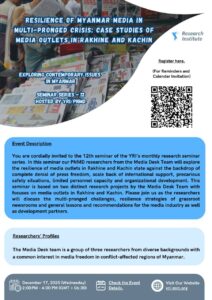Abstract
This research investigates the impacts of Cyclone Mocha and the broader challenges of climate change and environmental degradation on food security in Rakhine State, Myanmar. Focusing on case studies in Sittwe and Kyauk Phyu, the study highlights how Cyclone Mocha, which struck in May 2023, caused widespread destruction of infrastructure, agricultural lands, and livelihoods,
worsening the region’s food insecurity. Key issues include the socio-economic impacts of displacement and unemployment, exacerbated by ongoing political instability and restricted humanitarian access. The study employs qualitative research methods, such as in-depth interviews with affected communities, to assess the immediate and long-term impacts on food accessibility. Additionally, it explores the adaptive strategies employed by affected populations to achieve sustainable food security amid the challenges posed by recurring climate-related disasters. The findings reveal the interconnected nature of environmental, socio-economic, and political factors in worsening food insecurity in Sittwe and Kyauk Phyu. This study highlights the critical importance of ensuring food security by prioritizing the needs of vulnerable populations, integrating sustainable development practices, and addressing systemic barriers to recovery. By deepening the understanding of how climate change and natural disasters affect
food security, this research provides actionable insights for building resilient food systems in climate-vulnerable regions like Sittwe and Kyauk Phyu.

